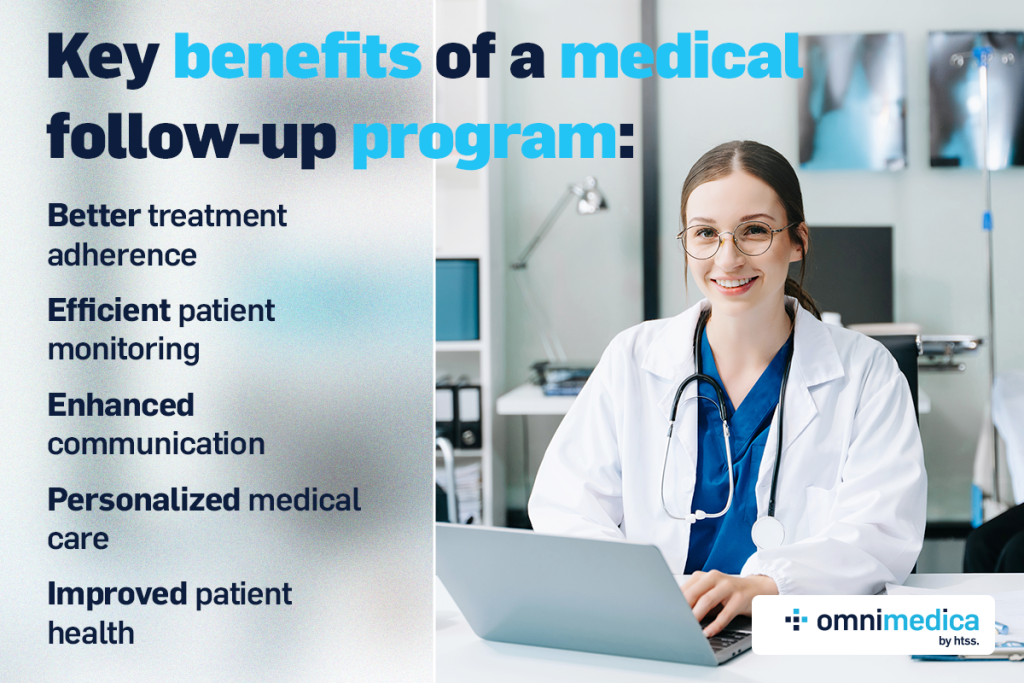- What is a medical follow-up program
- Benefits of a follow-up program for patients and physicians
- How can a follow-up program improve the quality of healthcare?
In today’s healthcare system, where improving patient experience and reducing medical complications are top priorities, medical follow-up programs have become essential. Studies show that an effective follow-up can reduce hospital readmission rates by up to 30%, meaning that patients receive closer monitoring and ongoing support after their initial treatment. In this article, we will explore the various benefits of a medical follow-up program and how it contributes to improving the quality of healthcare.
What is a medical follow-up program
A medical follow-up program is a well-structured system specifically designed to ensure continuity of care for patients after the completion of their initial treatment. This type of program involves periodic evaluation of the patient’s health status, management of any new symptoms, and adjustment of treatment plans if necessary.
Thanks to modern technologies such as telemedicine and digital communication platforms, patient monitoring can be conducted more efficiently, and the connection between patients and healthcare providers becomes stronger and more effective. These programs help prevent the worsening of patients’ health conditions and allow for the rapid identification of complications.

Benefits of a follow-up program for patients and physicians
With technological advancements and the diversification of communication methods, implementing a follow-up program is no longer just an option, but a necessity. A medical follow-up program significantly contributes to improving patient health, and those who participate in structured programs show a 50% higher adherence to their treatment plans compared to those who do not benefit from a proper follow-up. Here are the main benefits of a medical follow-up program.
Ensuring treatment adherence
One of the most important benefits of a follow-up program is improving patients’ adherence to treatment plans. After completing the initial treatment, many patients tend to neglect the recommendations they received or fail to follow the treatment plan accurately.
A regular follow-up helps patients become more aware of the importance of adhering to treatment, thus increasing their chances of full recovery. Moreover, knowing that they are being frequently monitored encourages patients to pay more attention to their personal care.
Early detection of complications
Regular monitoring of patients allows doctors to quickly detect any complications or symptoms that may arise after the initial treatment. Early identification of medical issues enables faster and more efficient interventions, minimizing the risk of hospitalization or invasive procedures. For example, a minor complication that is detected and promptly treated can prevent the development of a serious condition that would require additional medical interventions.
Improving communication
Communication is a vital aspect of the relationship between patients and healthcare providers. An effective follow-up program facilitates open and consistent communication between the patient and the doctor, which helps to better understand the patient’s health condition and medical recommendations. Enhanced communication not only increases patient satisfaction but also helps doctors provide care that is tailored to each patient’s needs.
Personalizing care
Another major benefit of follow-up programs is the ability to personalize medical care. By continuously monitoring the patient’s health, doctors can adjust treatment plans based on the progress of each patient. For instance, if a patient responds better to a certain type of treatment, the doctor can adapt the treatment plan to achieve the best results. This level of personalized care significantly improves the chances of recovery and enhances the overall quality of life for patients.
Reducing stress for patients
Patients who benefit from a follow-up program experience greater peace of mind, knowing they are constantly monitored and have access to the medical support they need. This reduces the stress and anxiety associated with their health condition, as patients are reassured that any medical issue that arises will be promptly and effectively managed. Additionally, patients feel more confident and supported, which contributes to faster and more efficient recovery.
How can a follow-up program improve the quality of healthcare?
Medical follow-up programs play a crucial role in improving the overall quality of healthcare. They ensure continuity of care, which is essential for preventing complications and maintaining patients’ health. Through proactive monitoring, doctors can intervene quickly when necessary, reducing the risk of hospitalizations and additional medical interventions. Additionally, follow-up programs facilitate better communication between patients and physicians, providing patients with a sense of security and trust.
In conclusion, implementing a medical follow-up program is a key strategy for any healthcare institution looking to improve the quality of services offered.
In this context, platforms like omnimedica provide advanced technological solutions that can optimize the management of follow-up programs, helping clinics and hospitals offer patients a superior healthcare experience. Don’t miss the opportunity to transform the healthcare experience with the digital solutions provided by omnimedica.




